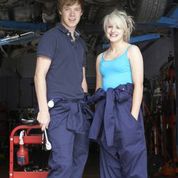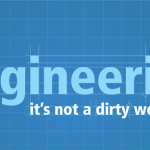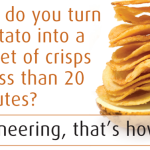Which kind of engineering do you want to do – mechanical, electrical, chemical or civil engineering? Read on to find out the difference…
Engineering is vitally important to the automotive, space, aeronautical, construction and defence sectors but engineers are involved to some degree in most major industries. You can go for a career in engineering regardless of whether you enter as a school leaver via an apprenticeship scheme or as an engineering graduate.

Mechanical engineering
This is the branch of engineering which deals with machines, mechanical systems and their design, construction, manufacture and maintenance. Jobs in this area include mechanical engineer, automotive engineer and aerospace engineer.
Chemical engineering
Chemical engineers turn raw materials into stuff we use every day, like fuel, plastics and food. If you enjoy in-depth research and solving problems, chemical engineering could be the career for you.
Studying chemical engineering could take you down a career pathway into all sorts of jobs. It plays an important part in the food industry for example, in crop growing and food production and preservation – think about ready meals, tinned foods, pre-packaged and long-life products – they all need to go through rigorous tests before they can be sold to the public.
Pharmaceutical engineering
This is vitally important in the field of medicine – think of all those pills and potions which need to be very precisely formulated and tested before they are allowed anywhere near a chemist’s shop or doctors surgery.
Food engineering
Providing solutions to food design, manufacturing and supply, food engineering fuses food science with engineering disciples. Food engineering covers a variety of areas including mechanical engineering, manufacturing systems, process control, energy efficiency and food safety.
As a food engineer you would be part of a team who deliver innovative and high quality products globally. Working from research and design through to packaging and transportation, food engineers apply the mechanical engineering study of structures, systems performance, and how fluids behave to safely and efficiently produce food and drink.
Electronic or electrical engineering
An electrical engineer is someone who designs, develops and tests electrical equipment. They can work with all sorts of electronic devices, from smart phones to supercomputers.
Electrical engineers can also be involved in designing telecommunications and power systems as well as utilising electricity to transmit energy. Electrical engineers can also design household appliances, lighting and wiring systems in buildings, electrical power stations and satellite communications.
Civil engineering
Civil engineers develop and improve the services and facilities we use and the infrastructures we rely on every day, including buildings, roads, airports, tunnels, dams, bridges, and water supply and sewage treatment systems. Related subjects to this sector are: Structural engineering (design of structures to withstand stresses and pressures imposed through environmental conditions and human use) and Architectural engineering (sometimes referred to as ‘building engineering’, the application of engineering principles and technology to building design and construction).
Marine engineering
Being a marine engineer involves designing, building, servicing and repairing boats, ships, underwater crafts and offshore platforms and equipment. You can work for private companies, the Ministry of Defence, the Merchant Navy or the Royal Navy.
You can find additional information relating to engineering on the SEMTA website and we have some great articles below.
 Moving On magazine Careers and Qualifications for School Leavers
Moving On magazine Careers and Qualifications for School Leavers


 A New Sparta Group Company
A New Sparta Group Company